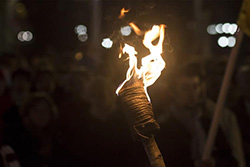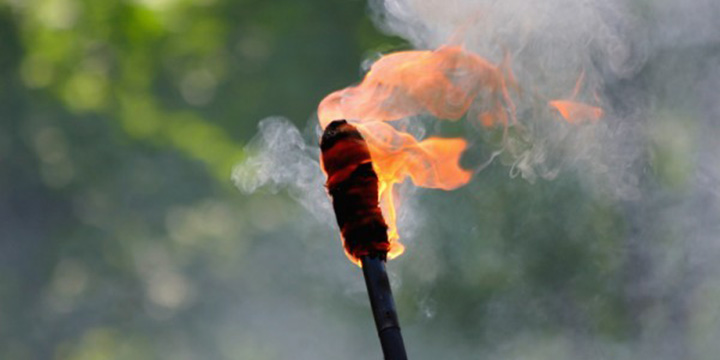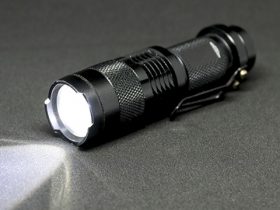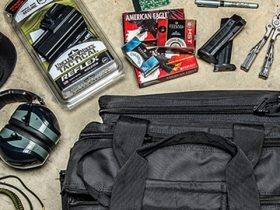There is something magical about the fire.
A fire has always been man’s best friend. It has warmed our homes, cooked our food, and turned darkness into day. The third use of fire is what we’re going to talk about today. Many people are thinking about survival in case there is a loss of power, social services, and food.
Many have spent a lot of money buying electric generators to light their homes, however, if things come down to that, it might be more advantageous to go with a more primitive solution that requires basic materials that can be found in the wild where you live.
We think instead of trying to use electricity, why not use a simple torch instead.
 Today, we are going to show you a variety of torch options you have available and with auditions use of vegetable oil over the more volatile gasoline, and kerosene you can light your world should things go south during a natural disaster or other calamities that disrupt the world, as we know it.
Today, we are going to show you a variety of torch options you have available and with auditions use of vegetable oil over the more volatile gasoline, and kerosene you can light your world should things go south during a natural disaster or other calamities that disrupt the world, as we know it.
Campers, hikers, and outdoorsmen of all stripes should learn these skills as well. Because flashlights take, batteries and batteries can fail for a number of reasons. However, pine trees and other trees have been producing natural fuels for millions of years and are likely to continue to do so in the near future.
Table of Contents
How To Make A Torch
Cattail Torch
Cattails make the perfect wick. If you have a supply of reeds, bamboo, and even a bottle filled with a flammable liquid, you have a torch that can be hung from support. You have the ideal torch for lighting your camp or even a lamp for your living room if you don’t mind a little soot on the ceiling.
Always remember to use any torch in a well-ventilated area. Our friends at Survival Manual dot com have detailed instructions and here is a link that will take you there to see how it’s done.
Should you want to learn more about the cattail and bulrush here is a link for that as well.
Indian Jones Torch
This is the torch that everyone has been dying to make since Indian Jones hit the Silver Screen many years ago. The Art of Manliness has the way of it, and it is simple to make.
The process is quite simple. You take a green branch and if you don’t want to tear your shirt into strips. You can cut a length of cloth 2-3 feet long and 3-6 inches wide. And you then wrap it tightly around one end of the branch. Now secure it in place, we used a staple gun with ours. We copied the idea from Instructables.com.
You next soak the torch in a flammable liquid for a few minutes to thoroughly saturate the cloth. The idea is to burn the fuel rather than the cloth as it acts as a wick. Once lit and the type of fuel you use. A torch like this is good for 30 minutes to an hour or more.
You can do the same thing with Kevlar and get better results.
Here are some additional tips to make the same kind of torch using vegetable oil again as an alternative to flammable gas or kerosene.
Swedish Torch
While not strictly a torch per say the Swedish Torch will provide light, cook your food, and even provide limited heating ability as well.
They are easily constructed with an old stump, a section of log, and even a number of tree limbs fastened together.
- Take a log turned upright or stump and cut a cross-shaped notch in the top of it with a hatchet, saw, or an Axe. The notches need not be that wide. A half-inch width is enough.
- Where the notches cross, place your tinder in the hollow in the center. Your tinder could be Fatwood, cotton soaked in Vaseline or other tinder you use to start fires.
- Light the tinder and the log or stump will provide the fuel.
- You can purchase a Swedish Torch kit that has a piece of flat metal with a place to drop metal rods through that keep the log/stump together.
Your camp is now lit and you have a flat surface to cook on even if you are not using the metal plate. Here is a video of how it all comes together.
Tiki Torch
The Tiki Torch is another take on the torch and it has many uses in ordinary circumstances other than in camp or in the event of an emergency.
As the name suggests it hails from the Polynesians such exotic places and a Hawaiian Luau are where most people are introduced to them. We have various links that will take you through the steps needed to make a low-cost variant of your own.
DIY Tiki Torch Oil
If you decide to make a Tiki Torch you might want to try making less smoking making fuel and see why once you learn what’s in the stuff that makes it burn. Here is everything you need to know.
Birch Bark Torch
Another method uses the bark of a tree to make a torch and it too is just wrapping a flammable material around a suitable handle that is long enough to keep you from being burned.
Pine Cones, tree sap, and pitch?
Yep, you can make a torch from them as well. Here’s how.
Simple and easy to do, remember you can use resin from pine trees and other like trees to use as a fuel source for fires, torches, and as a firestarter.
Final Thoughts
It is a lot easier and safer to stock up on vegetable oil. You can also cultivate the land to generate the oil needed for survival. That way you can become self-sufficient and light your home and property should something take out the grid. It might not be easy or, pretty but it works.
So if you want to go exploring in forgotten ruins or you just need some light around camp you now know how to without batteries, LEDs, and solar generators.
The natives of the Islands know how to make oil from plants, fire using a fire piston and they have been living pretty well for thousands of years using these primitive tools. Perhaps instead of going forward, we should re-examine where we have been.







Leave a Reply